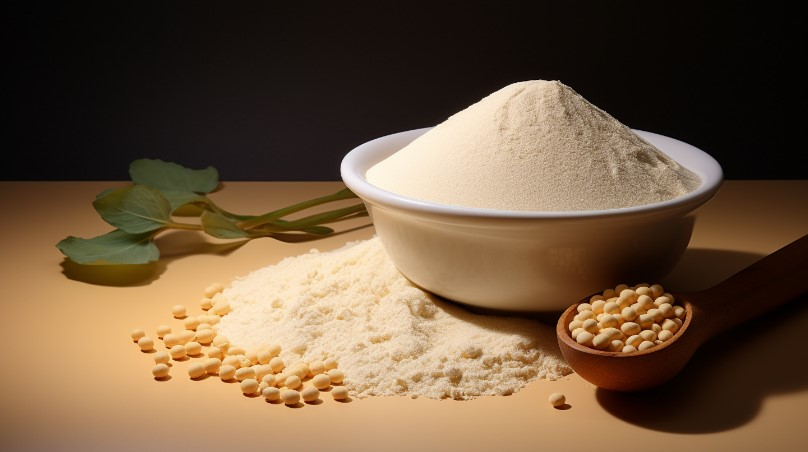Soy isoflavones and health

Soybean isoflavones are A kind of polyphenolic compounds. The soybean isoflavones in nature mainly exist in the form of glycosides, and their aglycans mainly include genistein (also known as fagin), daidzein (also known as daidzein), daidzein (also known as daidzein), daidzein, chickpea A (also known as gallanthin) and oncetin.
Because of its similar chemical structure with 17β-estradiol, it can bind to estrogen receptors and play the role of estrogen-like and regulating endogenous estrogen, so it is called phytoestrogen.
Estrogen-like effect
Soybean isoflavones can bind to estrogen receptors in different tissues and organs to play the role of estrogen-like or antagonistic endogenous estrogen. Soybean isoflavones are considered to be selective estrogen receptor modulators, and exhibit estrogen-like effects when endogenous estrogen levels are low. When the level of estrogen in the body is high, it shows anti-estrogen effect.
Meta-analysis showed that daily supplementation of soy, soy extract, genistein or daidzein for 3 months or more in postmenopausal women could effectively reduce the frequency of hot flashes and significantly improve perimenopausal symptoms.
Antioxidant effect
Soybean isoflavones can inhibit the production of oxygen free radicals, inhibit the production of hydrogen peroxide, reduce the oxidative damage of DNA and inhibit lipid peroxidation. Clinical studies have found that intervention with soy isoflavones can reduce the level of DNA damage and enhance the activity of glucosaminase in healthy women after 6 months.
Improve postmenopausal osteoporosis
Postmenopausal osteoporosis is caused by the loss of bone mass and the change of bone tissue structure due to the lack of estrogen after menopause, and soy isoflavone has the effect of estrogen, thereby improving osteoporosis.
A 5-year Italian study of more than 400 elderly postmenopausal osteoporosis patients showed that compared with the placebo group, the treatment group (isoflavone 600mg/d) not only had significant improvements in bone reserve and bone mineral density, but also showed significant changes in bone biochemical indicators after several months of treatment.
心血管疾患の予防と治療
In postmenopausal women, due to the decline of ovarian function, the deficiency of estrogen synthesis and secretion in the body, the decrease of estrogen level leads to the abnormal metabolism of fat and cholesterol, and the increase of blood fat and cholesterol leads to the increase of cardiovascular disease incidence. Soy isoflavones can prevent cardiovascular diseases through estrogen-like and antioxidant effects.
Beglehole’s epidemiological survey showed that the death rate of coronary heart disease in American women aged 40 to 69 was eight times that of Japanese women of the same age. After careful analysis of the data, the authors found that the effect of soy food on the reduction of atherosclerosis rate may be the main reason for the different mortality rates.
Multiple meta-analyses have shown that supplementation of soy isoflavones can improve the endothelium dependent vasodilation function of brachial artery and improve the function of vascular endothelial cells in healthy people, postmenopausal women, hypertensive people, hyperlipidemia people and stroke patients.
その他の機能
Studies have found that soy isoflavones are also associated with breast cancer, prostate cancer and lung cancer, especially breast cancer; In addition, there is a certain association with diabetes and kidney disease.
用法・用量
The adverse effects of excessive intake of soy isoflavones in adults may include nausea, vomiting, diarrhea and other gastrointestinal symptoms, edema, constipation and rash.
In American men, a single overdose of soy isoflavones may cause changes in blood indicators, such as increased lipase, decreased phosphate, and increased amylase, as well as decreased white blood cells, anorexia, leg edema, and abdominal tenderness.
Long-term intake of soy isoflavones may increase breast density in premenopausal women, vaginal cell changes and endometrial hyperplasia in postmenopausal women. High intake of dietary soy and soy isoflavones may also decrease urine estradiol levels in boys and increase urine testosterone levels in girls.
China’s recommended value: The SPL for preventing breast cancer in premenopausal, perimenopausal and postmenopausal women is 55mg/d; The dose for ameliorating perimenopausal syndrome was 60mg/d. The effective dose for improving postmenopausal osteoporosis is generally 80mg/ day.
The highest tolerable intake of soy isoflavones in postmenopausal women in China is 120mg/ day. UL is not prescribed for men and premenopausal women.
主な食料源
The main sources of soy isoflavones are soy and soy products, such as bean curd, bean flour, tofu, etc.
参考資料
[1] Chinese Nutrition Society. Reference intake of dietary nutrients for Chinese residents. Beijing: Science Press, 2014. [2]Gennari, C. , et al. “Effect of chronic treatment with ipriflavone in postmenopausal women with low bone mass.” Calcified Tissue International (1997).[3]Beaglehole, R. . “International trends in coronary heart disease mortality, morbidity, and risk factors. “Epidemiologic Reviews 12.1(1990):1.
Soy isoflavones supplier: www.backvita.com
Eメール:[email protected]
電話番号+86 (029) 8187 2325
